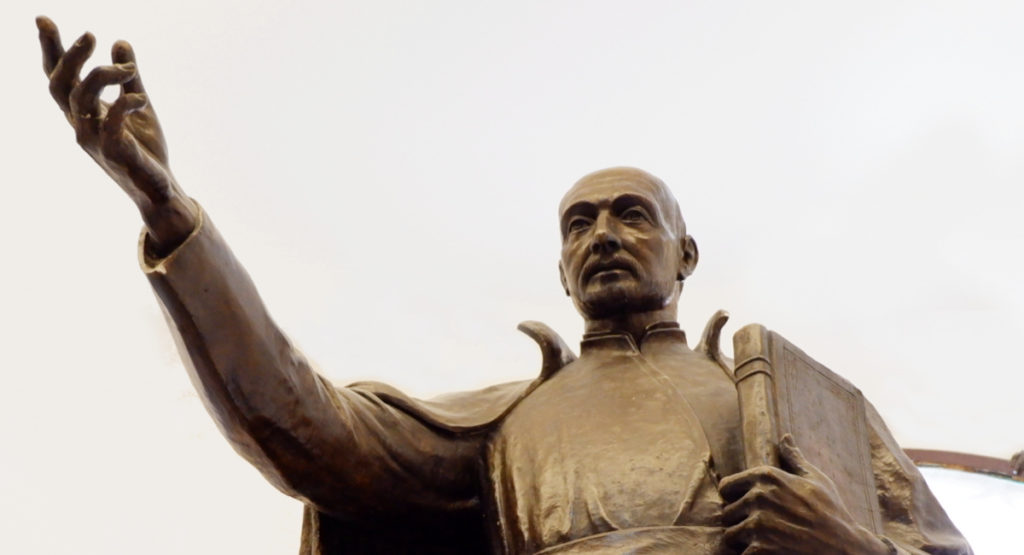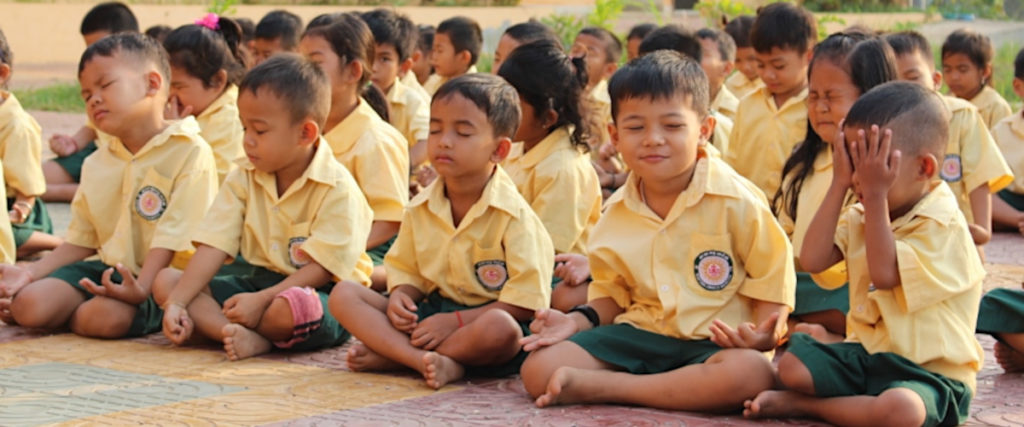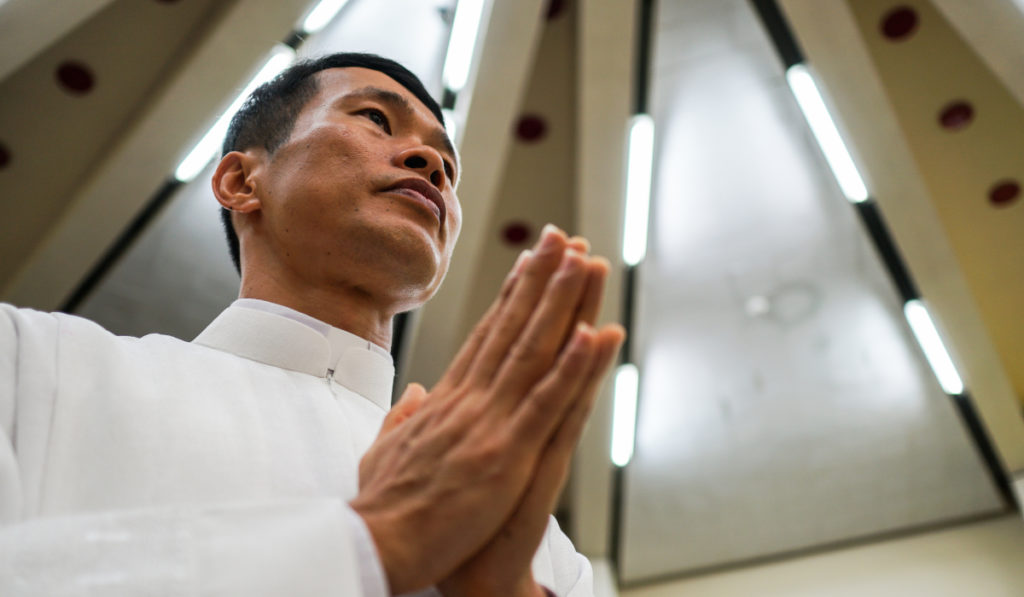Ignatian insights for living
Fr Brendan McManus SJ, who works in the area of spirituality and spiritual accompaniment in the Irish Province, says he has had a great life as a Jesuit. “The most valuable insights have come from the Ignatian training I have received, how to reflect on experience and make good decisions”, he shares.
From this perspective, he writes to his 15-year-old self 15 “rules of thumb” he has found useful in his life. All of them have Ignatian references. For example, in tip #2, he takes cue from St Ignatius that God is in our deepest desires, not the superficial ones. Working in the computer industry prior to joining the Jesuits, he acquired all the material possessions and status he thought he desired, but he found it to be “a desolatingly empty experience” and prompted a search for his “true vocation as a priest”.
But finding one’s true vocation does not mean living a perfect life. In tip #4, Fr McManus cautions against pursuing idealism and perfection so much that we beat ourselves up and agonise over its unattainability. “In Ignatian Spirituality there is spelled out the terrible dilemma of life that perfection and idealism, while seemingly good things, can often lead to disillusionment and despair… [T]here is normally a third option, or middle way, that threads a course between extremes.”
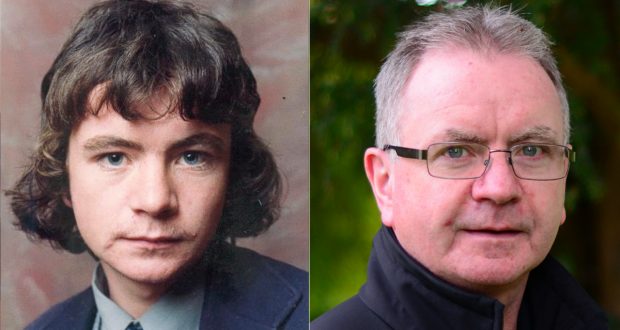
Fr McManus remembers that as a Boy Scout, he was taught there is always enough in your environment to solve the problem. “It’s never going to be ideal but there are options and decisions to be made… Therefore, instead of wishing it were different, look around and see what you can use.” In other words, instead of wishing for perfection, “Bloom where you are planted” (tip #7).
Indeed, there is no panacea for all of life’s troubles. “In my work as a spiritual director and hearing people talk about their lives, I often hear of the illusive search for the ‘silver bullet’ or magic ingredient that will suddenly solve all life problems”, Fr McManus shares in tip #8. In reality, the solutions are often mundane and process based, requiring effort and commitment on our part. Referencing St Ignatius: “God normally does not appear in the miraculous but through human processes; ‘everyday’ miracles.”
Do not be afraid to ask for help. In fact, “Asking for help is the greatest wisdom” (tip #10). “Often the obstacle is pride, independence and being afraid to be seen as weak or needing help. Ignatian wisdom has a really useful rule of thumb: you need to deliberately act against those negative impulses that stop us from getting the right help”, he says. Actively seeking out support makes life a lot more bearable.
“There are not limitless possibilities but possibilities within the limits” (tip #12). Fr McManus has discovered that knowing your limits, such as how far you can go without rest and food, can help you achieve significant goals of pilgrimage, collaborations and meaningful friendships. Walking the Camino, he says, is a real teacher of humility and respect for limits. “Hearing people, mainly young men, boast how they will walk twice as long and beat the ‘record’, never fails to amuse me as I was there once and have come to see the folly of pride!”
Finally, Fr McManus gives the most important tip to his young self and to each of us: “Let life teach you.” We have no control over the cards we are dealt but we have a choice about how we approach problems and opportunities. As Ignatian Spirituality teaches us, we can find God in the mess. “Though the stakes are very high and consequences are real and imminent, there is normally a way through and hope is our guiding light.”
To read all of Fr McManus’ “15 Ignatian rules of thumb”, click here.
Xavier Jesuit School children practice mindfulness meditation
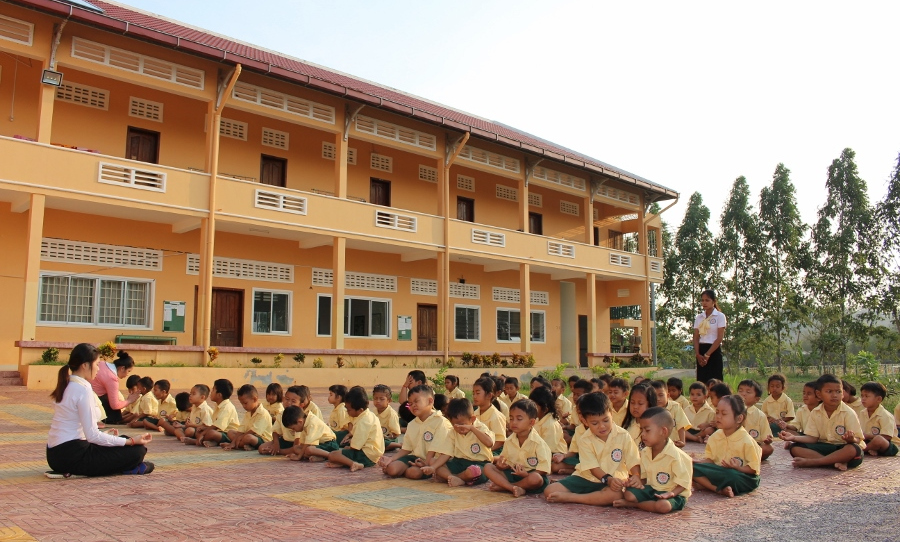 Xavier Jesuit School Cambodia introduced “Mindfulness Meditation” to the kindergarten and primary school students during their morning assembly and lunch break.
Xavier Jesuit School Cambodia introduced “Mindfulness Meditation” to the kindergarten and primary school students during their morning assembly and lunch break.
It was quite a challenge to get the kids to sit still, stay calm and close their eyes while concentrating on their own breathing.
Through hard work and a lot of patience, the teachers were able to overcome the difficulties and successfully accompany and guide the students through a mindfulness meditation exercise every day.
Now the students are very familiar with this daily activity. As soon as prayerful music is played their faces reveal enjoyment of this quiet and peaceful activity. Through mindfulness meditation, the students will develop a gentle and peaceful character, which is central to their Buddhist culture and tradition. [Xavier Jesuit School Cambodia]
Diaconate ordination in Taiwan
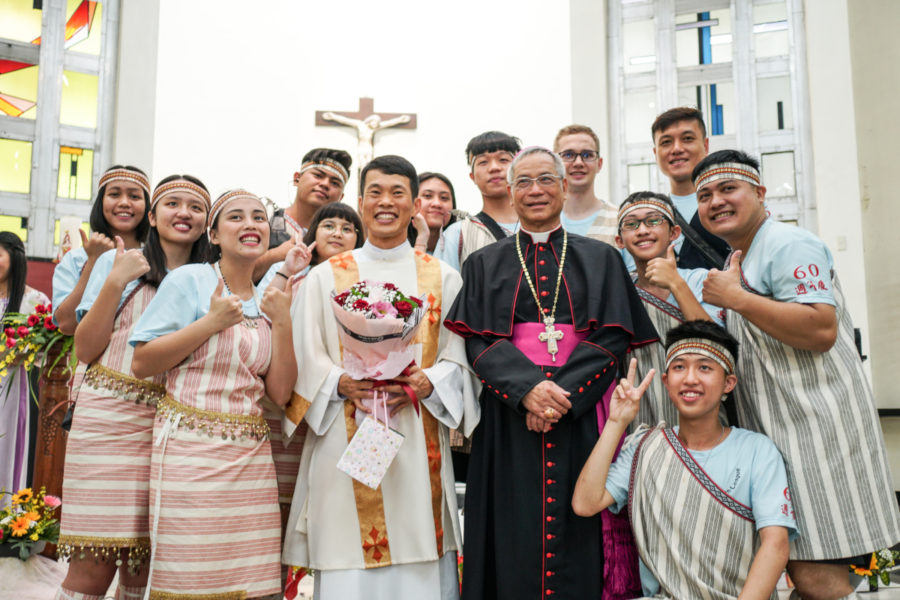 Family, friends and members of religious communities gathered on the bright morning of June 8 to witness the diaconate ordination of Joseph Dang Do Nhan SJ by Most Rev John B Shan-Chuan Hung SVD, Archbishop of Taipei. The Mass was held at St Robert Bellarmine Chapel of Fu Jen Faculty of Theology of St Robert Bellarmine, New Taipei City.
Family, friends and members of religious communities gathered on the bright morning of June 8 to witness the diaconate ordination of Joseph Dang Do Nhan SJ by Most Rev John B Shan-Chuan Hung SVD, Archbishop of Taipei. The Mass was held at St Robert Bellarmine Chapel of Fu Jen Faculty of Theology of St Robert Bellarmine, New Taipei City.
The solemn rites were celebrated with music, indigenous dance and choir. The atmosphere was warm and joyful. Archbishop Hung encouraged Deacon Dang to serve God and fulfil His Holy Words with a pure heart. He also asked the congregation to pray for the new deacon’s family who have generously dedicated their son to God.
Deacon Dang expressed his gratitude foremost to the Lord who continues to love sinners like him. Originally from Vietnam, he also thanked the Vietnamese Province, where the seed of his vocation was planted and grew, and the Chinese Province for accepting his desire for an international Regency. Lastly, he thanked his family for their company, support and encouragement.
Deacon Dang first thought of becoming a priest as a child. The dream gradually faded out, but many years later, while at Mass, he found himself very touched by the singing of the Peace Prayer of St Francis. This time he decided to respond to God’s call. When he shared his desire to pursue the priesthood with his mother, she told him it was a difficult road to follow. “Dare you go to the end?” she asked. Deacon Dang replied, ”Just support me and give the rest to God. He will surely help me to complete this journey!”
Indeed, Deacon Dang has deeply felt God’s love and help throughout his vocation. Looking back he says his most impressive experience is failure. Instead of being frustrated, he believes failure has taught him to listen, to open himself up, to accept others more easily, to comfort others and to help others out of their worries. In the process, he always thanks God for accepting his imperfections and filling in his shortcomings from time to time.
Deacon Dang admits he is nervous about the responsibility that lies ahead, yet he is filled with hope in spreading Jesus’ love through social services. He believes that when you serve, people can see you as a witness of love. Quoting John 15:12, he said, “Love one another as I love you.”
Educating for depth and reconciliation
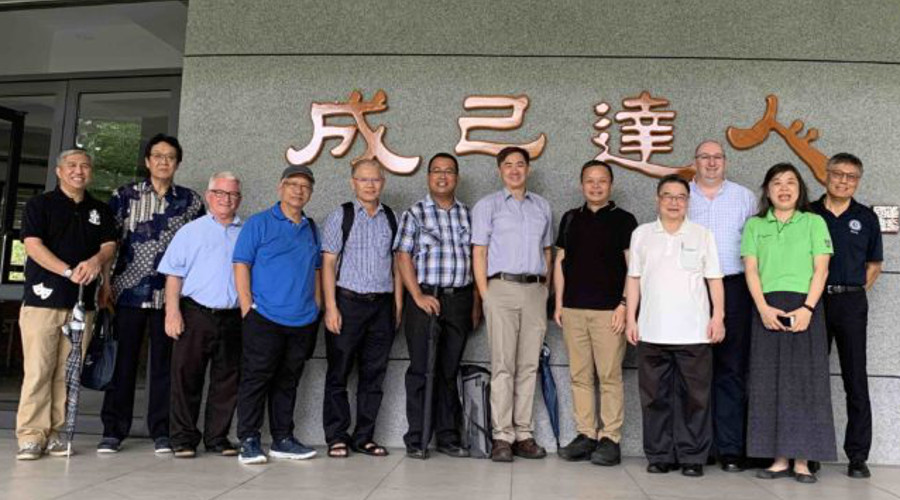
Education Secretaries of the Jesuit Conference of Asia Pacific (JCAP) were in Taipei from May 14 to 18 to discuss the II COLLOQUIUM JESEDU JOGJA 2020, and to identify concrete ways in which the Universal Apostolic Preferences (UAPs) of the Society of Jesus can be promoted by our schools.
II COLLOQUIUM JESEDU JOGJA 2020 is the second global gathering of Jesuit secondary schools. The first international colloquium was held in Boston College in 2012. About 500 school leaders will gather in Sanata Dharma University, Yogyakarta, Indonesia from June 29 to July 4, 2020 to learn more about “Educating for depth and reconciliation”.
The education secretaries held spiritual conversations on the UAPs. To concretise the conversations, they identified what they considered “crucial threats” and “promising opportunities” in their work of education.
“The discussions were rich and full of fresh insights that should guide our schools in concretising these apostolic preferences this decade”, said JCAP Education Secretary Fr Johnny Go SJ. “The conversations about the UAPs are expected to continue among our schools”, he added.
Apart from the annual reports from the Provinces and the Regions, the group also took the opportunity to visit St Ignatius High School (徐汇中学), where each learned about the school’s flagship formation programme called Life Education.
A call for a compassionate and humane Australian society
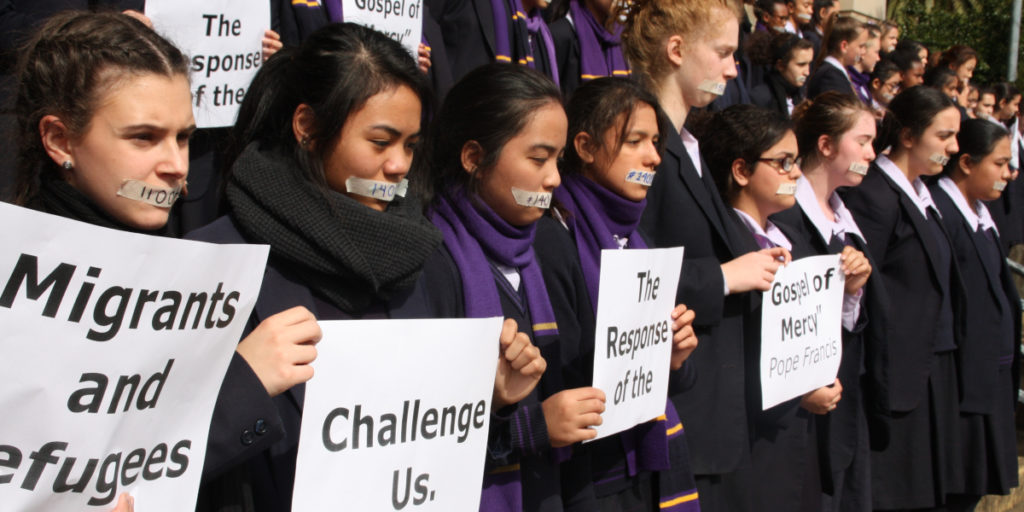
With the Federal Election in Australia on May 18, the Catholic Alliance for People Seeking Asylum (CAPSA), in which Jesuit Social Services takes a lead role, has issued a statement calling for a “commitment from all sides of party politics to language and policies that reflect a compassionate and humane Australian society”.
The statement draws on the words of Pope John Paul II and calls for a change in the way Australia sees, treats and lives together with people seeking asylum.
“[W]e need to heed the words of Pope John Paul II ‘to see Christ in every brother and sister in need, to proclaim and defend the dignity of every migrant, every displaced person and every refugee. In this way, assistance given will not be considered an alms from the goodness of our heart, but an act of justice due to them’”, the statement said, quoting Pope John Paul II’s speech to the participants in the Assembly of the Council of the International Catholic Migration Commission in 2001.
CAPSA urges the incoming Federal Government “to legislate and make policies that are fair and compassionate” adding that the “[d]iscriminatory treatment towards people seeking asylum who have arrived by boat to Australia is unnecessary for the security of our borders. It is possible to be both fair and kind.”
The organisation lamented the current situation of people seeking asylum in Nauru and Manus islands and the “thousands of vulnerable individuals and families who are at risk and suffering destitution due to Government support being removed and no longer offered”.
The statement said it is everyone’s challenge “to use language and to act in a way that consistently acknowledges the human dignity and preciousness of each person who seeks asylum”.
Australia is the first country from the Pacific region to serve on the UN Human Rights Council.
CAPSA calls on political leaders and policy makers to re-work the way Australia complies with its international obligations and the personal needs of those who seek asylum.
“Australia’s current policies and processes relating to those seeking asylum, with distinctive discrimination against those who arrived by boat, cannot be characterised as fair – nor can the large sums of money spent on detention centres, both onshore and offshore”, they said.
The organisation reiterated its commitment to serve, assist and journey with people seeking asylum and refugees across the health, education, pastoral and social spheres.
“The Catholic community stands ready to continue our work of welcome. Our political leaders must introduce and champion policies that complement the wonderful work that so many Catholic parishes, schools, organisations and congregations do to welcome and accompany people newly arrived to this country.”
Read the full statement here.
Global Compacts: walking with the excluded and the marginalised
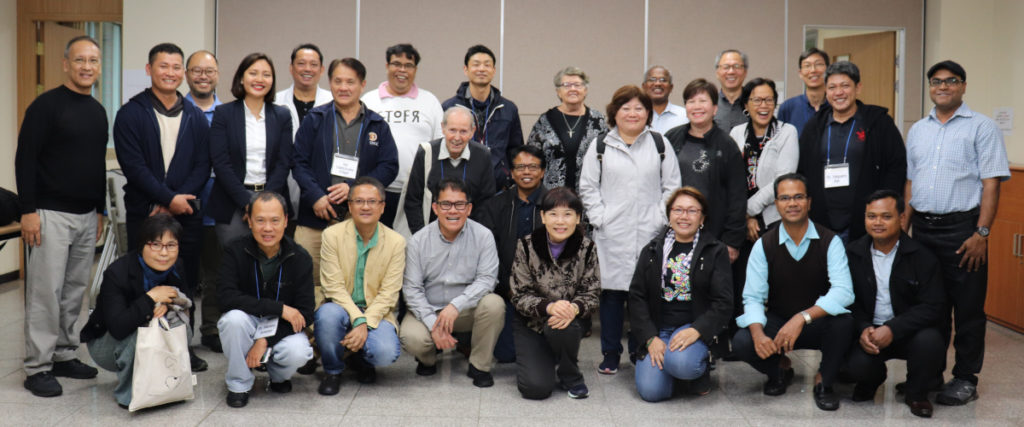
In a time of increased globalisation, it is a sign of the times to live with the “stranger”. How do we prepare for the increasing number of migrants and refugees, and what should be our focus?
From April 25 to 29, the Jesuit Conference of Asia Pacific (JCAP) Migration Network hosted a forum at the Jesuit Center, Seoul to discuss an important question – what should we do at the moment when we are witnessing an increased presence of migrants and refugees in our communities? Twenty-five of us from 13 institutions, and 12 countries discussed how to better welcome, protect, promote and integrate migrants and refugees and the best way to build a network and work together.
The forum specifically focused on the Global Compact on Refugees (GCR) and Global Compact for Safe, Orderly and Regular Migration (GCM), which were adopted in December last year. We discussed how to implement the Global Compacts and how to advocate for the implementation of these significant agreements focusing on each nation’s context and regional realities.
The GCR was adopted to respond to the challenges of 68.5 million forcibly displaced people worldwide and to look at responsibility sharing between different member states. The adoption of the GCM was a historic development to protect the rights of migrants as the first instrument focusing on increasing international collaboration to address international migration in all its forms.
One hundred eighty-one countries adopted the GCR and 164 countries adopted the GCM. The GCR focuses on responsibility sharing and complements existing international Refugee Law including the Refugee Convention of 1951 and its additional protocol. The GCR aims at increasing responsibility sharing between states looking at the needs of countries hosting a high number of refugees, promoting refugees’ self-reliance and promoting durable solutions, including safe and dignified return. The GCR aims at collective efforts for refugee focused solutions and equitable responsibility sharing.
The GCM is the first instrument of its kind with 23 targeted objectives to address international migration in all its forms including addressing drivers of migration, focusing on migrants in vulnerable situations, increasing regularisation pathways, promoting decent work and labour rights, addressing climate induced displacement and taking measures to end child immigration detention, amongst others. The positive response from many countries shows that refugees and migration are our common challenges requiring a global response.
Unfortunately, the GCR and GCM are non-binding instruments. The Global Compacts are not an international treaty but an agreement, which means that member states can decide how they implement them in accordance with their national priorities. All countries that adopted the Global Compacts committed to protect and promote the rights of refugee and migrants but they can decide how to do it. At this early stage national implementation of the GCs is uncertain. So civil society and faith based organisations’ concerted effort including advocacy and putting pressure on each national government is critically important for the implementation of the GCs.
The forum in Seoul focused on two themes. The first was to increase understanding on the GCs. The second was to study good practices of advocacy. The aim was to encourage the development of networks and increased collaborations for refugees and migration.
During the first session, Jane Williamson of UNHCR Korea clarified the significance of the GCR. She pointed out that the GCR promotes a “whole of society” approach including governments and civil society and long-term and ongoing plans of refugee solutions. She compared the GCR with previous conventions and concluded that the GCR is a more comprehensive response requiring networking between government and civil society, different countries and between the national and local levels.
Carolina Gottardo, Director of Jesuit Refugee Service (JRS) Australia and the focal point on the GCM for Asia Pacific Refugee Rights Network (APRRN) expounded on the GCM and the implementation architecture of both Global Compacts. She stressed that it is important for the Church and Church institutions to implement the GCR and GCM. She said there have been several agreements and conventions on refugees but the GCM is the first global comprehensive agreement looking at all dimensions of international migration. It is not legally binding but it has a good normative potential.
Naoko Maruyama, Regional Coordinator of East Asia and Southeast Asia for the Migrants and Refugees Section, Vatican, introduced “20 action points for the Global Compacts” and said that it is the mission of the Church and Church institutions serving migrants and refugees to “welcome, protect, promote and integrate” them.
We also had other sessions examining the cases of promoting and protecting migrants and refugees’ human rights. Nishadh Rego, Policy and Advocacy Coordinator of JRS Australia, talked about the meaning and role of advocacy activities in the areas of migration and refugees and how advocacy activities could be developed in the specific context which each institution faces. In the process of advocacy, it is important to consider the potential to achieve the goal. When we try to achieve a certain goal or value, it is necessary for us to focus on the specific goals that we would like to achieve.
Dany Gerra of Solidarity with Migration, an activist NGO in Korea, shared his experience as an undocumented migrant worker and community leader. His message focused on advocating for human rights of Overseas Filipino Workers in Korea. On April 28, we visited YIUTSARI, the Jesuit institution for migrant workers, and had the opportunity of listening to the voices of Vietnamese and Filipino migrant workers living in Korea.
The JAP Migration Network at YIUTSARIFor us in the JCAP Migration Network, the implementation of the GCs may be understood in the context of the Universal Apostolic Preferences. The implementation can be enlightened by our commitment to “walk with the excluded and the marginalised”. JCAP President Fr Tony Moreno SJ pointed out that responding to the issue of migration and refugees is a priority and necessitates an inter-conference and inter-provincial collaboration. The effort for collaboration, he said, should be based on discernment and planning.
After a four-day meeting, the participants reached the following conclusions.
First, the JCAP migration network will focus on deepening understanding of the two Global Compacts. It is important for ordinary people to understand the implications of the GCs on migration and refugees, considering that these GCs are significantly important in the history of migration and refugees. We agreed that the network will translate these key documents into local languages and also produce video clips and animation on the GCs.
Second, the GCs are a comprehensive framework for migration and for the network. The network recognises the fact that each country has its own specific context and naturally we need to contextualise the GCs on the realities of each country. Internal research will be completed as part of the preparatory process for national implementation of the GCs.
Third, the network will find partners for advocacy programmes on the implementation of the GCs. Church institutions such as Caritas and other organisations – especially APRRN – could be our partners for advocacy and awareness-raising on migration and refugees.
The next meeting will be in Indonesia in 2020. Until then, the JCAP Migration Network will share all information related to the process of implementation of the GCs and other services for migration and refugees.
Fr Min Johan Kim SJ is the Coordinator for the JCAP Migration Network. He co-wrote this article with JRS Australia Director Carolina Gottardo.
Learning to become schools of discernment
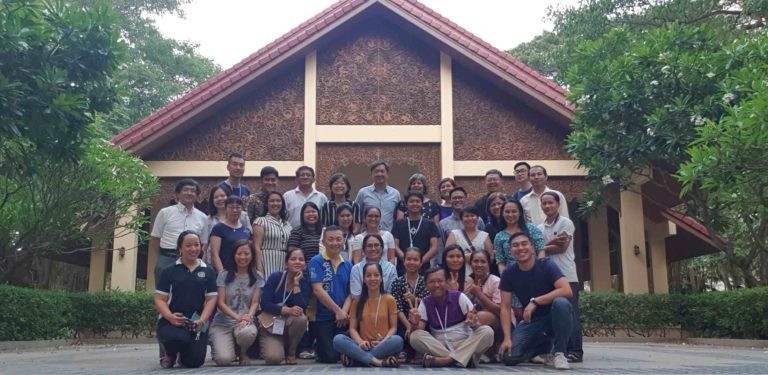
From April 26 to May 1, a diverse group of educators from Jesuit schools in Cambodia, Hong Kong, Japan, Macau and the Philippines met at the Seven Fountains Retreat Center in Chiang Mai, Thailand for a workshop on “Apostolic Planning and Decision Making through Communal Discernment”. The title is a mouthful; after all, discernment in common is a complex and difficult, albeit worthwhile process.
The participants had a first-hand experience of discernment in common, one of the identified Universal Apostolic Preferences of the Society of Jesus. There was emphasis on listening to others as well as listening to one’s interior movements. The spiritual conversations were conducted in mixed groups to allow the participants to learn from one another’s contexts and cultures. There were moments of personal prayer and reflection in preparation for the spiritual conversations.
“It was important for the participants to listen attentively not only to members of their own groups, but also to the plenary reports from the small groups. It is counter to what educators are accustomed to, given their workload and busy lives”, said Fr Johnny Go SJ, Education Secretary for the Jesuit Conference of Asia Pacific (JCAP).
Fr Go facilitated the workshop together with Jennie Hickey, Executive Officer of Jesuit Education Australia, Fr Roy Ragas SJ of Emmaus Center for Psycho-spiritual Formation and Jeraldine Ching from Xavier School in the Philippines.
The JCAP Ignatian leadership workshops have become known for their socials. Delegates from Ateneo de Cebu / Sacred Heart Jesuit School in the Philippines organised an evening of games to break the ice and build a sense of community. Consequently, one of the best parts of the workshop was the friendships formed. “These personal relationships are the crucial ingredient to the networking that we hope to strengthen among our schools in Asia Pacific”, said Fr Go.
The participants were most grateful for the actual experience of spiritual conversations. “We ended the workshop with the optimistic resolve to find ways of incorporating some of the elements of communal discernment in selected decision-making processes in our schools”, said Fr Go. “As Jennie put it at the end of the workshop, we hope that our schools will truly become schools of discernment.”
A leadership rooted in discernment
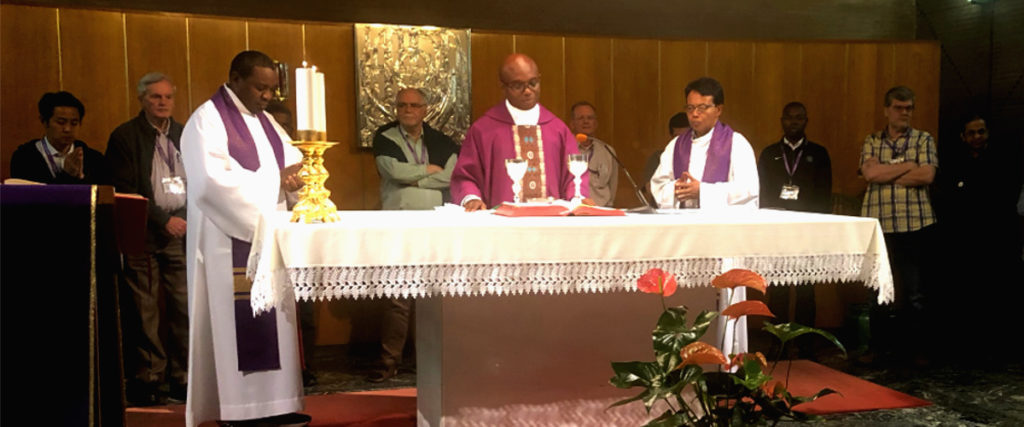
I am grateful to have been a part of the Ignatian leadership and discernment meeting in Rome. The combination of community prayer, personal reflection, group sharing and discussions gave a balance to how we as participants explored our mind, heart and will. Our diversity, coming from the six Jesuit conferences, only served to enrich our experience.
The Constitutions of the Society of Jesus offer very rich elements of leadership that can be applied not only by Jesuits but also by anyone who wants to learn about Ignatian leadership. Ignatian leadership is deeply rooted in discernment and the Spiritual Exercises. As a Jesuit, I can share this rich Ignatian spirituality with my co-workers, partners and anybody who is interested to learn.
Although I have read the Universal Apostolic Preferences (UAPs) several times, I was moved by Father General’s address that the UAPs should be approached from a spiritual perspective. They are inspirations rooted in the discernment of the Spirit and spiritual motivations that can move people to implement them. They are also universal in the sense that they are not only for Jesuits and our lay collaborators but can be offered to others as an inspiration in responding to and addressing the problems within and outside the Church.
Ignatian leadership is deeply rooted in discernment and the Spiritual Exercises. As a Jesuit, I can share this rich Ignatian spirituality with my co-workers, partners and anybody who is interested to learn.
The abuse crisis offers lessons in leadership and discernment. A lack of both has kept sexual abuses in the Church “hidden” for a long time. Policies, systems, procedures and codes of conduct for handling sexual abuse are sadly not in place. I was shocked and sad to hear Sr Pat Murray IBVM share not only about cases of sexual abuse experienced by women religious but also other forms of non-sexual abuse, such as bishops or priests who employ sisters as unpaid domestic workers and treat them like “servants”.
Victims of abuse and indeed the larger society are now questioning the integrity of the clergy who violate the law of love and human rights to which they should proclaim and give witness. In a way, this painful experience puts the Church in the First Week of the Spiritual Exercises. We are sinners, but we are called to be His companion for His mission in spreading the Good News. The courageous leadership of Pope Francis in this very difficult time brings hope that the Church will move forward to the Second Week of the Spiritual Exercises: meditating on the life of Jesus and conforming our life to that of His. Ultimately, these abuse cases remind me to continuously reflect on my religious life as a Jesuit.
Those of us who were chosen to attend the meeting constitute a community of practice for communication and collaboration in the implementation of the UAPs. Matthieu Daum introduced to us the U theory, a tool to help us carry out the UAPs. It offers an integrated process of sensing, presencing and realising – a very Ignatian way of implementing a cycle of action and reflection. My hope is that we can use the UAPs as points of personal prayer and reflection, truly guiding us in our exercise of leadership in our networks, communities and ministries.
- Fr Adrianus Suyadi SJ is the Secretary for Social Ministries of the Jesuit Conference of Asia Pacific. He was one of six delegates from the conference who participated in the Ignatian leadership and discernment meeting in Rome from April 1 to 5, 2019.
Watch this video summary of the five-day meeting in Rome:
Ignatian leadership and discernment in light of the Universal Apostolic Preferences
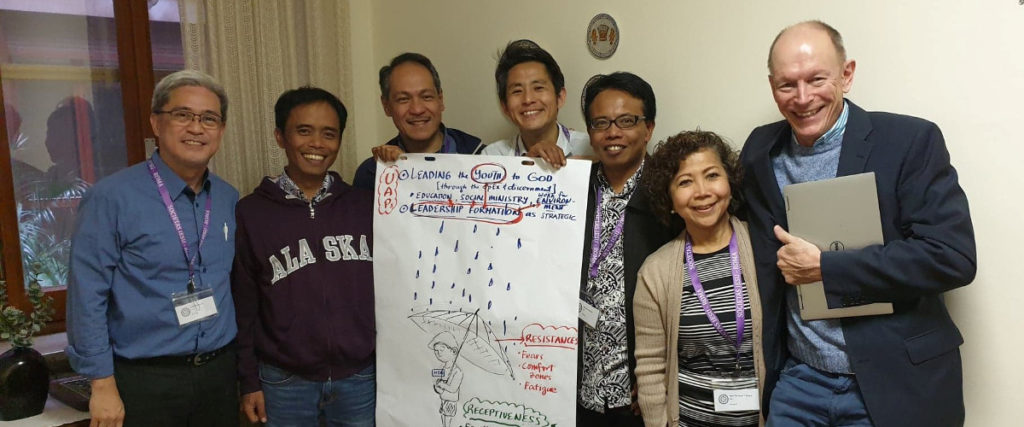
Over 50 Jesuits and lay collaborators gathered at Monte Cucco, just outside of Rome, to reflect on how Ignatian leadership and discernment can help realise the newly identified Universal Apostolic Preferences (UAPs), a mission from the Holy Father released to the Society of Jesus.
The participants composed of leadership development practitioners coming from a range of ministries – from parishes to retreat centres, high schools to universities, outreach centres to refugee services to province offices – included six from the Jesuit Conference of Asia Pacific (JCAP): Fr Jojo Magadia SJ, Regional Assistant for Asia Pacific; Fr Adrianus Suyadi SJ, JCAP Secretary for Social Ministries; Fr Non Yamauchi SJ of the Japanese Province; Fr Benny Juliawan SJ of Sanata Dharma University in Indonesia; Dr Edna Franco of Ateneo de Manila University in the Philippines; and Fr Karel San Juan SJ, President of Ateneo de Zamboanga University also in the Philippines.
Fr General Arturo Sosa SJ told all those gathered that the UAPs are “a call to conversion” and not merely a strategic plan or a checklist of ministries and activities. He also underlined the use of the term “preferences” rather than “priorities”. Whereas priorities emphasise the primacy of certain apostolates, probably establishing new ones and relegating some old ones, preferences should be understood more as “orientations” for focusing all Jesuit apostolates in the next 10 years.
“‘Orientations’ primarily are about giving direction which helps us reconsider and recalibrate our life and mission. UAPs are not about what to do, rather they are an inspiration about how to do, as Fr General put it”, shared Fr Juliawan.
“Working in institutions that are heritages of Jesuit legends and having very limited number of Jesuits and lay collaborators, I used to feel very lonely and powerless to respond to our mission. The conference gave me a new inspiration”, said Fr Yamauchi.
The meeting held from April 1 to 5 emphasised discernment as essential in leadership. Fr John Dardis SJ, General Counsellor for Discernment and Apostolic Planning, asked the participants to be open to a “prayer for leadership” that promotes spiritual conversion. The participants engaged in spiritual conversations in voicing their hopes and fears for the future of the Society of Jesus.
“Ignatian leadership centres around the formation of spiritual persons who are united with God in all their deeds. These persons build trust and inspire people around them to grow and work collaboratively for a mission. The mission in question is the mission of the Society”, said Fr Juliawan.
About half of the participants were lay people, evincing the move towards greater collaboration.
“They are really committed people who consider themselves Ignatian and even members of the Jesuit family”, said Fr Juliawan.
Dr Franco, a lay participant, serves as executive director of Ateneo de Manila’s Center for Organization Research and Development. “It was a priceless gift to be in the same room with Fr General and 49 other individuals from 23 coutries working as a community on the desire of the Society of Jesus ‘to find the best way to collaborate in the Lord’s mission, the best way to serve the Church at this time, the best contribution we can make with what we are and have, seeking to do what is for the greater divine service and the more universal good’”, she shared, quoting a letter of Fr General introducing the UAPs.
For Fr San Juan: “The meeting is an example of networking and collaboration of Jesuits and lay colleagues across cultures, to facilitate sharing of resources and expertise, and to foster friendship and community.”
The meeting reminded me of the proverb ,“More haste, less speed”, said Fr Yamauchi. “In order to implement the UAPs, we should not rush to conclusions. Instead we should start a pilgrimage of discernment with our collaborators. Although the process may take time, it is our way of proceeding. It is how we can implement the preferences in our life and mission.”
In his address Fr General used the term the “Collaborative Society” (Minima Compania Collaboradora) and encouraged the participants to promote lay vocations to be partners or collaborators in the mission.
“The call for collaboration is certainly growing louder”, said Fr Juliawan, “and if the Jesuits are serious about this, some changes to the way the Society is governed must be introduced in the future to reflect their significance.”

